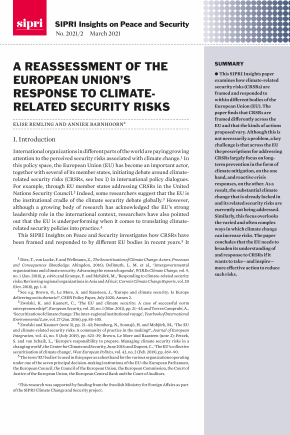A Reassessment of the European Union’s Response to Climate-related Security Risks
This SIPRI Insights paper examines how climate-related security risks (CRSRs) are framed and responded to within different bodies of the European Union (EU). The paper finds that CRSRs are framed differently across the EU and that the kinds of actions proposed vary. Although this is not necessarily a problem, a key challenge is that across the EU the prescriptions for addressing CRSRs largely focus on long-term prevention in the form of climate mitigation, on the one hand, and reactive crisis responses, on the other. As a result, the substantial climate change that is already locked in and its related security risks are currently not being addressed. Similarly, this focus overlooks the varied and often complex ways in which climate change can increase risks. The paper concludes that the EU needs to broaden its understanding of and response to CRSRs if it wants to take—and inspire—more effective action to reduce such risks.
I. Introduction
II. Backdrop: The advancement of climate security debates in the European Union
III. Analysis: The frames and responses to climate-related security risks
IV. Discussion: Why mitigation diplomacy and reactive crisis responses do not address the emerging climate-related security risks
V. Ways forward: The need for preventative action on climate-related security risks


